Ever since its commercial introduction about 150 years ago, the automobile has transformed human societies and the environment in unimaginable ways, with whole cities having been designed around the four-wheeled carriage, and highways now traversing almost every country around the world.
To continue reading, subscribe to Eco‑Business.
There's something for everyone. We offer a range of subscription plans.
- Access our stories and receive our Insights Weekly newsletter with the free EB Member plan.
- Unlock unlimited access to our content and archive with EB Circle.
- Publish your content with EB Premium.
Aided by popular culture, where the automobile has starred alongside icons such as James Dean and Steve McQueen, cars have evolved beyond being a means of transportation into a status symbol and aspirational lifestyle choice.
But while allowing humans to travel farther and faster, carmakers have also become one of the biggest drivers of man-made global warming, accounting for 9 per cent of global greenhouse gas emissions last year as markets—especially in emerging economies—continue to grow, a new study launched by environmental group Greenpeace has found.
The group says the automotive sector, ignoring repeated warnings of impending climate catastrophe, has shirked demands for a phase-out of petrol and diesel cars and failed to promote energy-efficient, battery-powered vehicles while pouring millions of dollars into lobbying efforts to undermine initiatives to reduce heat-trapping emissions from the transport sector.
The study, which analysed the climate impacts of the world’s 12 leading car companies, shows that Volkswagen was the biggest climate culprit last year, followed by Renault-Nissan, Toyota, General Motors, and Hyundai-Kia. These top five emitters are responsible for 55 per cent of the industry’s carbon footprint.
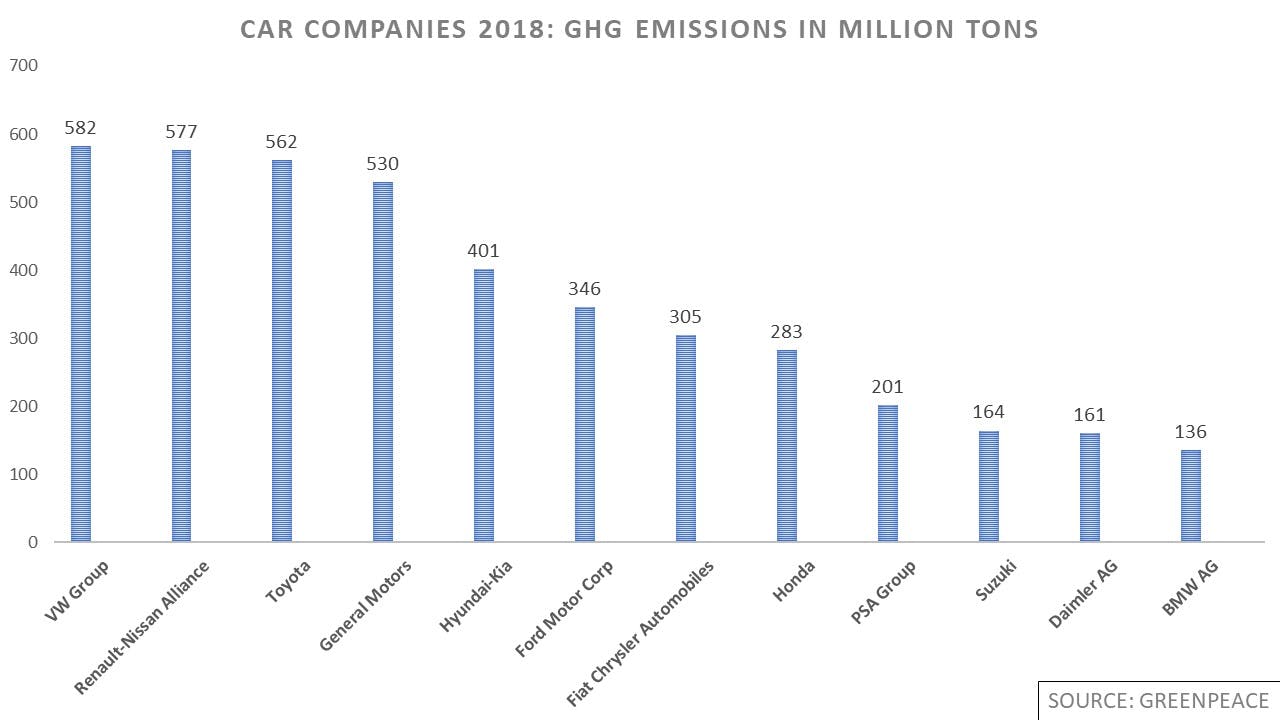
Eco-Business graphic: Greenhouse gas emissions of car companies in 2018. French car manufacturer PSA Group sells automobiles under the Peugeot, Citroën, Opel and Vauxhall brands. Source: Greenpeace
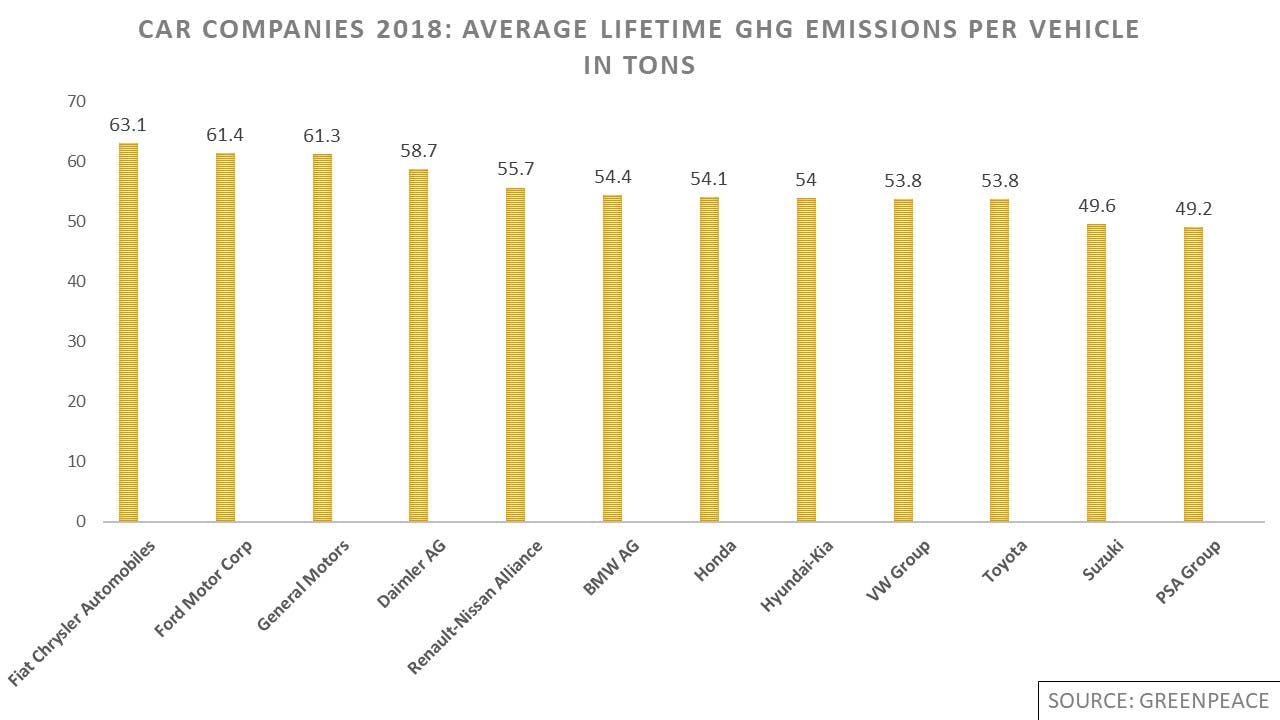
Eco-Business graphic: Average lifetime greenhouse gas emissions per vehicle in tons. French car manufacturer PSA Group sells automobiles under the Peugeot, Citroën, Opel and Vauxhall brands. Source: Greenpeace
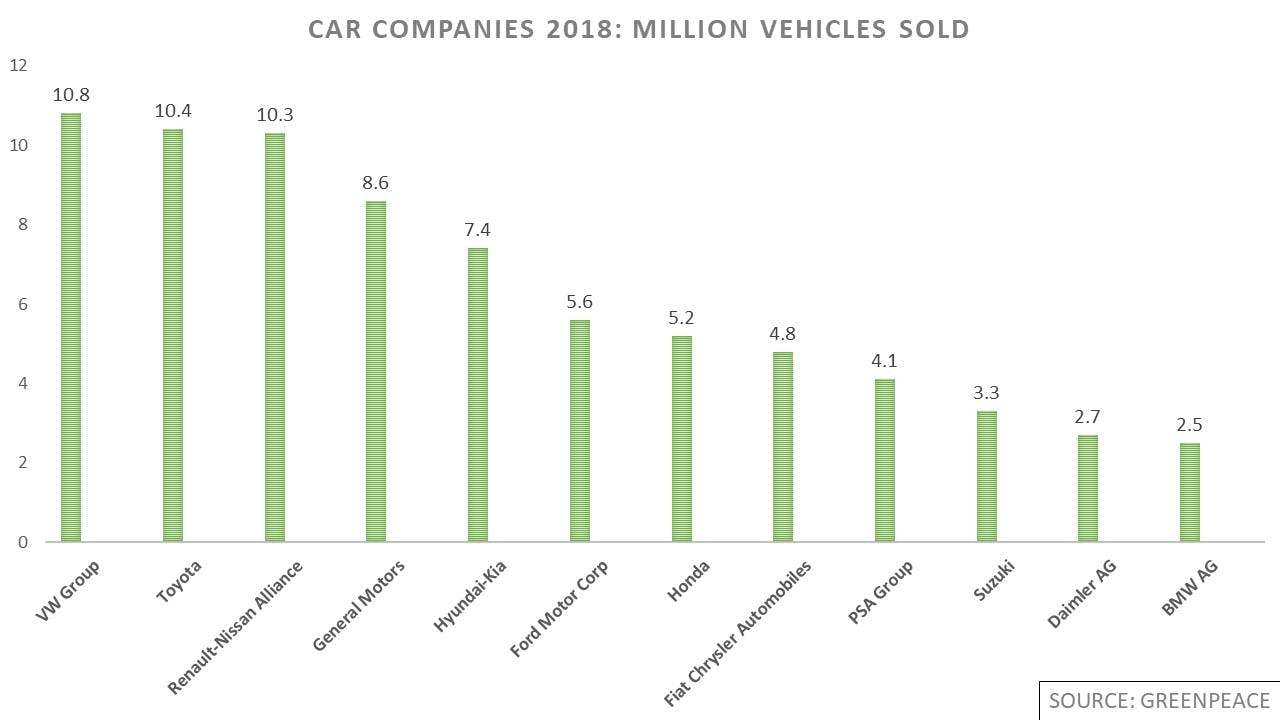
Eco-Business graphic: Car companies 2018—million vehicles sold. French car manufacturer PSA Group sells automobiles under the Peugeot, Citroën, Opel and Vauxhall brands. Source: Greenpeace
Greenpeace urges automakers to end sales of all internal combustion engines by 2025 and accelerate the adoption of all-electric vehicles to help meet the Paris objective of limiting global warming to 1.5C.
But a fundamental question looming over the switch towards cleaner mobility is whether consumers have to be the drivers of the transition, or whether car companies should take the lead.
Thomas Deloison, mobility director at World Business Council for Sustainable Development (WBCSD), an organisation of industry leaders designed to promote sustainability in the corporate world, said one of the reasons why carmakers have hesitated to invest in electric vehicles was concern over whether customers would purchase plug-in cars.
Günther Scherelis, spokesperson for environmental affairs and sustainability at Volkswagen, said that ultimately, the speed of transition depended on market readiness. “We cannot dictate to customers which cars they buy. We have to sell the vehicles they are willing to purchase,” he shared.
Takashi Ogawa, spokesperson for public affairs at Toyota Motor Asia Pacific, noted: “We have all the technology, but for us to bring battery-electric cars to the market, it is not enough to develop and produce these vehicles. They need to be purchased by customers, and that is one of the biggest challenges.”
“
Climate change isn’t news. IPCC has been around for decades; the warnings have been there. But carmakers have been dragging their feet and failed to prepare for the transition needed.
Jiseok Kim, climate and energy specialist, Greenpeace Korea
But Greenpeace blames auto manufacturers for their slow shift towards greener mobility, saying the industry has failed to prepare for the transition due to a lack of commitment and misdirected capital flows, and that in its relentless pursuit of profit, it has enticed customers away from cleaner alternatives, locking itself into higher carbon emissions for decades to come.
Jiseok Kim, climate and energy specialist at Greenpeace Korea, said: “Climate change isn’t news. IPCC has been around for decades; the warnings have been there. But carmakers have been dragging their feet and failed to prepare for the transition needed. The shift will not be easy, but who put them in that position? They could have made it easier for themselves by moving in the right direction early on.”
One of the industry’s missteps, the Greenpeace report reads, has been carmakers’ persistent marketing of large and fuel-inefficient sports utility vehicles (SUVs), promoting these gas-guzzling giants as a lifestyle choice, while smaller alternatives are less heavily marketed.
The study shows that in 2018 manufacturers spent more on advertising SUVs than on any other segment, as these vehicles bring firms higher profit margins than smaller passenger cars.
In Europe, the market share of SUVs increased more than fourfold over the past decade—from 8 per cent in 2008 to 32 per cent in 2018—while four out of five vehicles sold in the United States last year were SUVs. This rapid growth has stalled progress in carbon emissions reduction, the Greenpeace report reads.
Similarly, companies have been reluctant to adopt electric vehicles, as their aftersales profits could drop dramatically. This is because electric vehicles have fewer moving parts compared to combustion engine cars, meaning less mechanical wear and tear and reduced servicing requirements, the non-governmental organisation says.
And as companies move to electrify their vehicles, many do so by developing hybrid vehicles—cars that combine a conventional engines with an electric motor and a battery. But hybrid technology, although delivering some reduction in carbon emissions, cannot achieve the emission cuts needed while blocking the development of real alternatives, Greenpeace’ analysis shows.
The emissions cars release as they guzzle fuel are not all automakers need to worry about. With the sourcing of materials and vehicle manufacturing accounting for about 15 per cent of an automobile’s overall emissions, firms must also change how they produce vehicles, Deloison of the World Business Council for Sustainable Development noted.
Rethinking car designs and using materials that are easier to recycle, for instance, could enable companies to recover resources at the end of a car’s lifecycle and channel them back into production, he said.
Shifting a reluctant giant
German mechanical engineer Karl Friedrich Benz rolled out the first commercially available automobile propelled by an internal combustion engine in 1888. Since those early days, when cars moved on wooden-spoke wheels and featured leather shoe brakes, automobile engineering has advanced dramatically.
But two centuries of engineering expertise has centred around gas-guzzling engines. This has resulted in an immense internal resistance to the much-needed transition away from fossil fuels, Greenpeace’ Jiseok Kim, who previously worked for Hyundai’s environment strategic team in Seoul, told Eco-Business.
“Job security has become a major concern among mechanical engineers and engine experts in the industry because many of them lack the expertise to switch to manufacturing electric vehicles,” he shared.
The trend towards hybrids, Kim said, is just another symptom of carmakers clinging to conventional technologies such as internal combustion engines, mechanical transmissions and emission treatment systems.
“
If we want to survive, we must become carbon neutral.
Günther Scherelis, spokesperson, environmental affairs and sustainability, Volkswagen
The car industry supports more than eight million jobs globally, making it one of the world’s largest employers. If automotive manufacturing were its own country, it would be the 6th largest economy.
Shifting such a giant industry towards cleaner mobility takes time, and with the responsibility to avoid large-scale job losses, manufacturers cannot move as fast as the climate urgency requires, noted Deloison of the WBCSD.
Volkswagen’s Scherelis shared the adoption of electric mobility required the industry to fundamentally change manufacturing processes, establish new supply chains and train its workforce—a huge task for a giant like Volkswagen, which has about 40,000 direct suppliers and employs 660,000 people.
As of 2018, the global fleet of electric vehicles exceeded 5.1 million—up 2 million from the previous year—and will reach an estimated 13 million by the end of the decade as customer perceptions change, governments implement more stringent regulations, technology advances, and costs fall.
Consultancy firm Deloitte estimates that by 2022 the cost of ownership of a battery electric vehicle will be on par with its fossil fuel-powered counterparts.
Demand for battery-powered vehicles has shot up even in Southeast Asia, where electric car ownership is still relatively low, with one in three consumers in Singapore, Indonesia, Thailand, Malaysia, Vietnam and the Philippines planning to buy a car open to purchasing an electric vehicle, a recent study by Frost & Sullivan revealed.
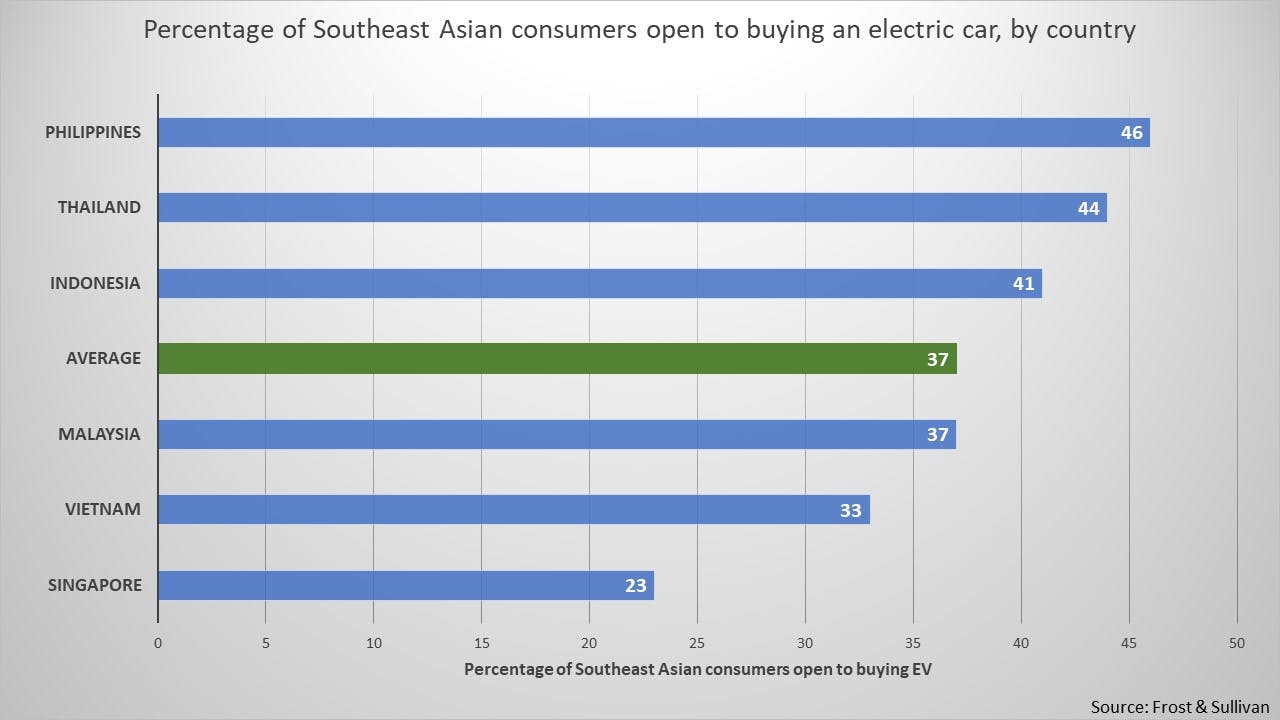
Eco-Business graphic: Percentage of Southeast Asian consumers open to buying an electric car, by country. Source: Frost & Sullivan
Governments have a critical role to play in paving the way for cleaner mobility by offering incentives and programmes to boost electric vehicle sales, said Vincent Wijnen, senior vice president at Nissan Asia & Oceania.
Norway, for instance, has been providing tax benefits, road toll exemptions and free access to car ferries for battery-powered car owners for decades and now boasts the largest share of electric vehicles in the world.
In Southeast Asia, Thailand plans to implement tax exemptions for electric vehicle manufacturers, while the Philippines are set to introduce excise duty exemptions for battery-powered cars and hybrids.
Several countries and cities are also making bold strides to push carmakers to slash harmful emissions.
More than 15 nations, including France, the United Kingdom and India, have implemented fuel economy and emissions targets or even announced they will phase out petrol and diesel engine cars, while various cities across Europe are already restricted for gas guzzlers. In Asia, Beijing is moving to limit the number of new petrol and diesel vehicles registered.
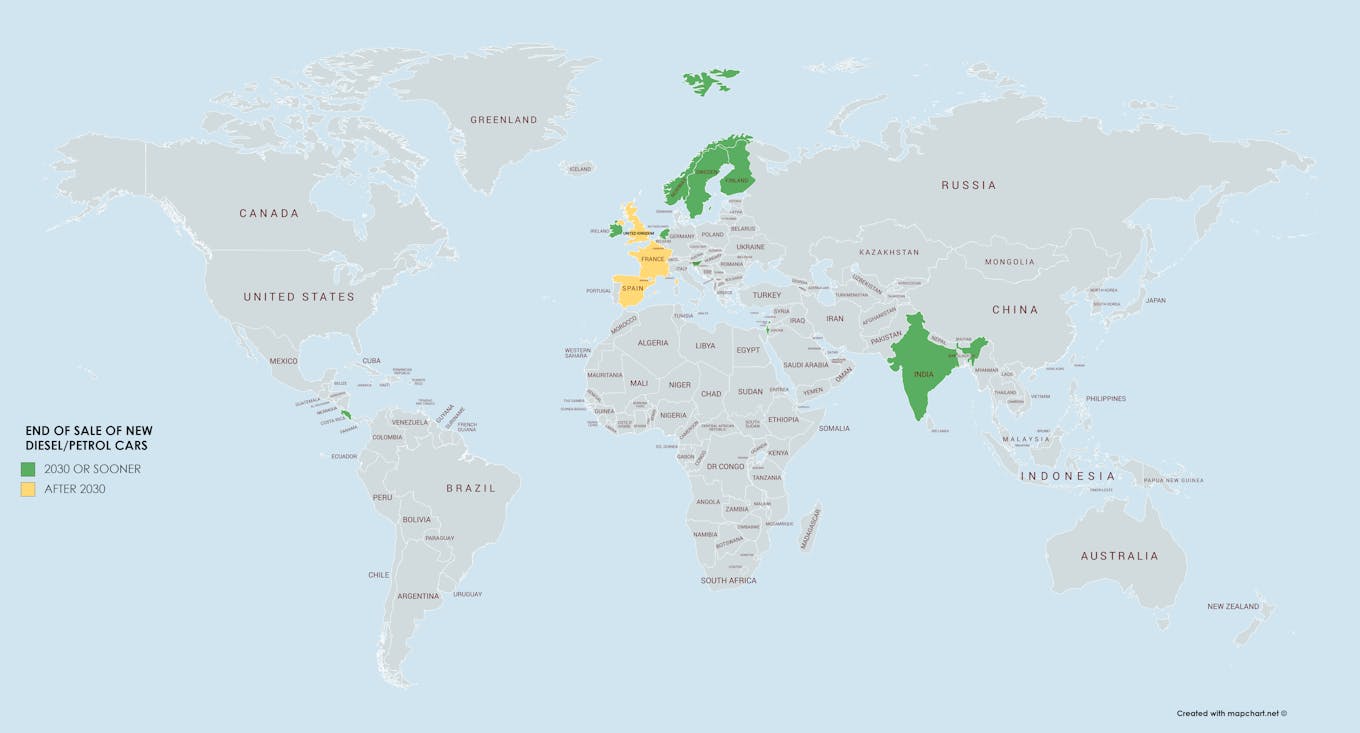
Eco-Business graphic: Countries phasing out petrol and diesel cars. Norway, Finland and Sweden will end sales of diesel and petrol cars in 2025, Ireland, India and Israel by 2030. France, Spain, the United Kingdom will roll out the last gas guzzlers in 2040. Source: Greenpeace
Policymakers must also help establish charging infrastructure, a spokesperson at Renault told Eco-Business.
Kumail Rashid, sales manager for Asia Pacific at engineering giant ABB, said setting up public fast-charging stations was the only way to address customers’ range anxiety—the fear of running out of power—to nudge more consumers towards battery-powered vehicles.
“The pace at which charging infrastructure is being deployed is still not up to par, making it that much more difficult for consumers to consider moving to electric options,” he noted.
But once the next generation of all-electric cars hits the road, range anxiety will become history, with new models boasting driving ranges comparable to their combustion engine counterparts, said Deloison of the World Business Council for Sustainable Development.
And while the cost of electric vehicles is currently high compared to conventional gasoline engine cars, advances in battery technology would help reduce the price, swaying more consumers to go electric, while increasing sales will enable companies to use the economies of scale to cut costs further, said Vincent Wijnen of Nissan Asia & Oceania.
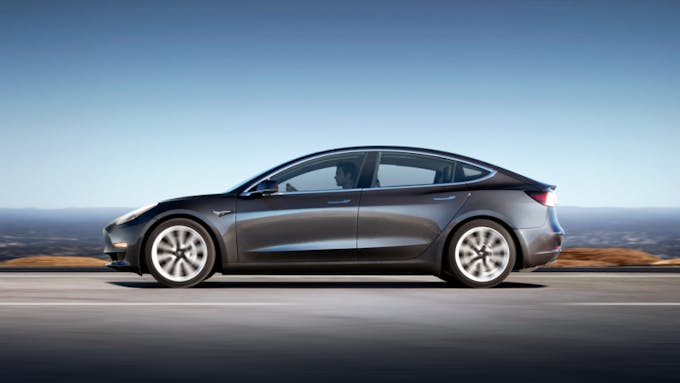
The all-electric Tesla Model 3, which has become the best-selling car in the Netherlands and Switzerland. Image: Peter Stevens, CC BY 2.0 via Flickr.
Of the 12 manufacturers Greenpeace evaluated, only Volkswagen has set a timeframe to phase out internal combustion engines globally.
Other carmakers Eco-Business contacted, including Nissan, Audi, Renault and Toyota, have not established concrete plans to phase out gas guzzlers, but said they were working to expand their offer of battery-powered cars.
General Motors and Hyundai, both among the world’s most polluting automakers, declined to respond to queries from Eco-Business.
Electric cars still account for only a small fraction of the 1.4 billion cars around the planet, but with sales on the rise and countries moving away from internal combustion vehicles, battery-powered vehicles could soon gain the upper hand and see demand for conventional automobiles dwindle. This could happen as soon as 2024, Deloitte estimates.
Already, the Tesla Model 3 by American automaker Tesla has become the best-selling car in the Netherlands and Switzerland. Such developments give a strong market signal that there is a limited future for fossil fuel cars and should spur automakers to transform their business models and ramp up the adoption of electric vehicles, Greenpeace says.
Only establishing new supply chains and investing in alternative solutions early will help manufacturers prepare for the transition and gain a foothold in the mobility sector of the 21 century. Otherwise, Greenpeace says, carmakers risk falling behind.
“
More and more customers prefer not to own a vehicle but to share cars. This will reduce the number of automobiles needed and affect our new vehicle sales, but there are also new business opportunities.
Takashi Ogawa, spokesperson, public affairs, Toyota Motor Asia Pacific
“If car companies fail to transition and diversify, they will be history,” the report reads.
Scherelis of Volkswagen said: “What we have seen during the past few years is that climate change is real and affects everyone. It is a necessity for the whole industry to become carbon neutral. If we want to survive, we must become carbon neutral.”
Reimagining the car industry
86 million cars were sold last year, driving carbon emissions to an all-time high. In some European countries and the United States, emissions from transport have become the biggest source of carbon emissions, the Greenpeace report shows.
The scale of emissions and the speed of their growth mean that it is critical that automakers rethink their business model, which has thrived on customers’ desire to own their own car, and invest in alternative mobility solutions such as car-sharing or ride-pooling services, Greenpeace says.
Deloison said alternative mobility would have an impact on carmakers as car sales go down, but there were also opportunities in diversifying their business model and providing new services.
Takashi Ogawa of Toyota Motor Asia Pacific shared: “More and more customers prefer not to own a vehicle but to share cars. This will reduce the number of automobiles needed and affect our new vehicle sales, but there are also new business opportunities. Whether we like it or not, we must adjust and transform our company from a traditional car manufacturer into a mobility company.”
Around Asia, Toyota is taking advantage of these new opportunities, said Ogawa. The firm recently launched a partnership with Grab in Southeast Asia, while in Japan, it has introduced a leasing service that allows customers to use cars for a while before returning them.
In Europe, firms such as Audi, Volkswagen and Renault are also offering such services, coordinating carsharing and car-pooling systems through smartphone apps to ease traffic congestion and improve air quality in cities.
While trends towards electrification, alternative solutions, connectivity and automation are set to disrupt the car industry, they represent the biggest opportunity to redefine the automotive sector of the 21st century, said Deloison.


